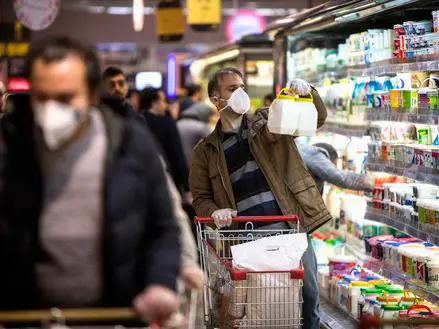Iran on Friday called for international help for its fight against the raging epidemic caused by COVID-19. Meanwhile, a state of emergency took effect in Palestine where nine new cases of infection were reported.
The international community "has a duty" to help Iran fight the novel coronavirus outbreak, said Iranian Foreign Minister Mohammad Javad Zarif, noting that Iran's efforts would only succeed if the countries in the region and around the world "shoulder their share of responsibilities and cooperate with Tehran."
"We either win together or lose together," Zarif was quoted by Press TV as saying.
Zarif issued the call for help as the novel coronavirus has claimed 17 more lives in Iran on Friday, bringing the death toll in the country to 124. A total of 4,747 people were confirmed with the viral infection by Friday, 1,234 more than a day ago.
The World Health Organization (WHO) said on Friday that it does not endorse international flight restrictions on Iran amid the outbreak of COVID-19.
Richard Brennan, regional emergency director for WHO, was quoted by Iran's official IRNA news agency as saying that although WHO recommends all countries to adopt restrictions in emergency situations, "it currently does not agree with such (flight) restrictions to be imposed on Iran."
He made the remarks on Thursday on the sidelines of a meeting on the epidemic in Iran, which was attended by foreign diplomats and Iranian officials.
Brennan stressed that the WHO makes no recommendations about imposing restrictions on flights to and from Iran, adding that the decision by the airliners in this regard should be evaluated and endorsed by the WHO.
In Lebanon, the Rafic Hariri Hospital announced that six more people were tested positive for COVID-19 infection, bringing to 22 the total number of confirmed cases in the country.
Meanwhile, the ministerial committee appointed by the Lebanese Council of Ministers for the fight against coronavirus issued emergency measures to stop the virus' spread.
The committee urged public and private schools to be kept closed, in addition to the closure of night clubs, sports clubs, exhibitions and theaters. It urged people to avoid crowded places and gatherings, and religious authorities to reduce the number of people visiting mosques and churches.
In Israel, the Ministry of Health announced on Friday that four more Israelis were diagnosed with the novel coronavirus, as the total number of confirmed cases rose to 21.
The ministry said that all the four patients recently returned home from overseas, two from Madrid of Spain, one from Switzerland, and one from Austria.
Also on Friday, Egypt's Health Ministry and WHO announced in a joint statement that 12 Egyptians were tested positive for COVID-19.
The 12 Egyptians were infected on a Nile cruise from Aswan to Luxor, said the statement on the ministry's Facebook page.
The cases have been taken to hospital and are currently receiving necessary medical care, the statement added.
In Palestine, a 30-day state of emergency against the COVID-19 spread took effect on Friday, as nine new cases of infection were reported, bringing the total number of confirmed cases to 16, only one day after the first seven cases were detected.
Palestinian Health Minister Mai al-Keileh said that all the new cases were also detected in the West Bank city of Bethlehem, where the first seven cases were announced on Thursday.
The first seven cases were the workers in a hotel in Bethlehem, who were believed to be infected during contacts with one of the Greek tourists who stayed in the hotel later last month.
Palestinian President Mahmoud Abbas on Thursday declared a state of emergency imposed in the West Bank for 30 days as part of the precautionary measures to contain the virus' spread.
The Palestinian Ministry of Tourism and Antiquities banned the entry of tourists into the West Bank where all hotels were required to stop receiving tourists for two weeks.
For Palestine, tourism is the main artery of its economy. The holy cities of Bethlehem and Jerusalem are estimated to attract about 3.5 million tourists and pilgrims from across the world each year.
Many are worried that the anti-coronavirus measures, including a ban on tourists, will cost the Palestinian tourism sector dearly and deal a huge blow to the struggling economy.
"If the crisis goes on for too long, the economic consequences in the city and entire Palestine will be disastrous," said Elias el-Arja, director of the Hotels Association in the Palestinian Territories and owner of one of the hotels in Bethlehem.
 简体中文
简体中文

